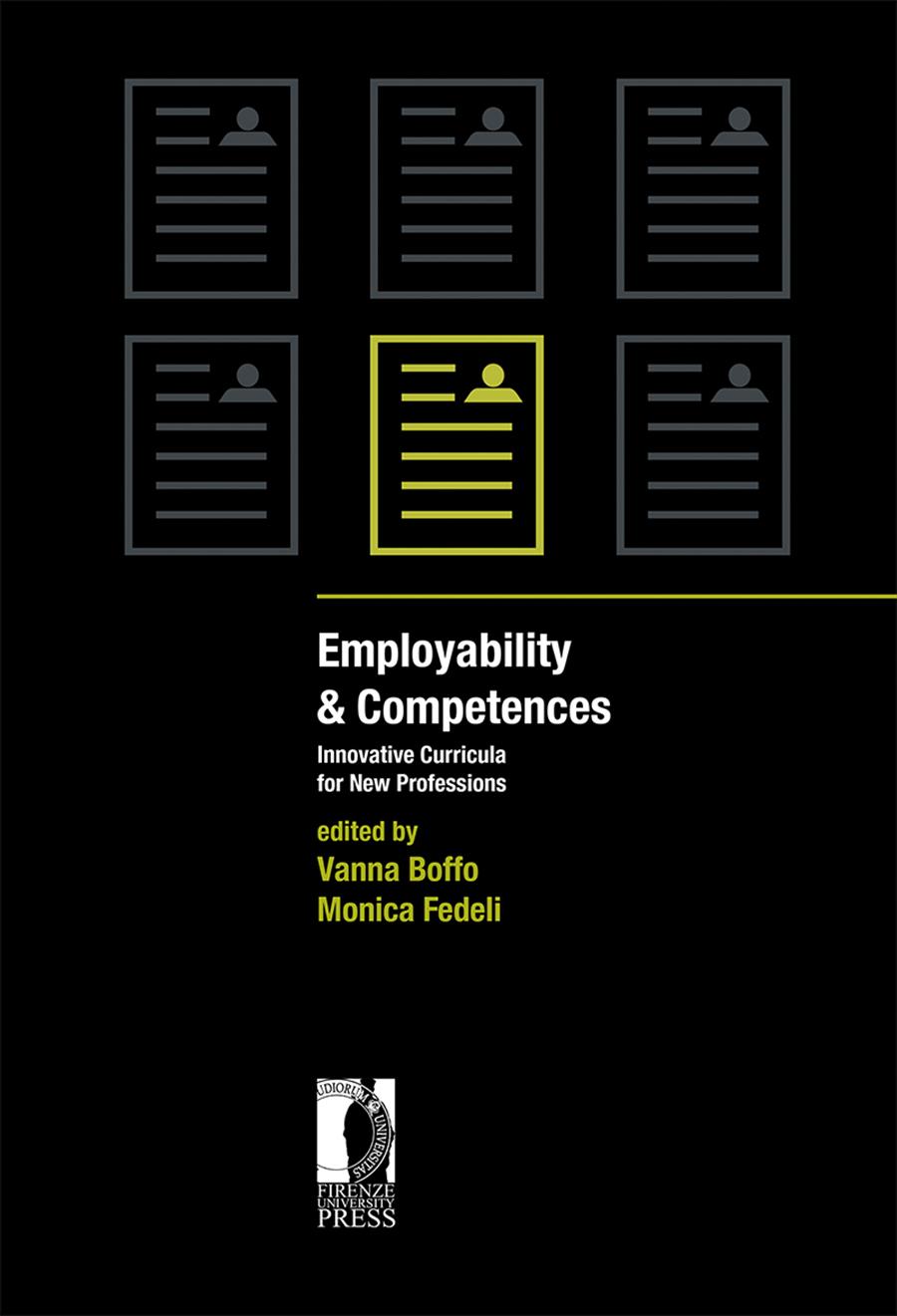- Employability & Competences
- Edited by Vanna Boffo, Monica Fedeli
Employability and Transitions: Fostering the Future of Young Adult Graduates
- Vanna Boffo
- © 2018 Author(s) |
- CC BY 4.0
- DOI: 10.36253/978-88-6453-672-9.19
Starting from questions inspired by the tremendous changes taking place in the worlds of education and employment, this research focuses on the role of employability in the building of new skills in higher education contexts. This longitudinal survey conducted on a sample of 52 graduates from the Educational Science sector found certain key characteristics in the transitions to the world of work, allowing reflection on those educational activities whose impact is more favourable to develop job placement
- Keywords:
- employability,
- adult education,
- higher education,
- competences,
- work pedagogy,
University of Florence, Italy - ORCID: 0000-0002-6502-2484
- Brynjolfsson E. and McAfee A. 2014, The Second Machine Age. Work, Progress, and Propserity in a Time of Brilliant Technologies. W.W. Norton & Company, New York.
- Ecclestone K. 2007, Keynote Presentation to Researching Transitions in Lifelong Learning Conference, University of Stirling, 22-24 June 2007, <http://www.leeds.ac.uk/educol/documents/175854.doc> (01/2018).
- Furlong A. and Cartmel F. 2007, Young People and Social Change: New Perspectives, (fully revised 2nd Edition), Open University Press, Buckingham.
- Glaser B. 1992, Basics of Grounded Theory Analysis, Sociology Press, Mill Valley.
- Glaser B. and Strauss A. 1967, The Discovery of Grounded Theory. Stategies for Qualitative Research, Aldine, Chicago.
- Guba E. 1990, The Paradigm Dialog, Sage, Newbury Park.
- Harvey L. 1999, New Realities: The Relationship Between Higher Education and Employment, Keynote presentation at the European Association of Institutional Research, Lund, Sweden, <https://goo.gl/5JnchK> (01/2018).
- Harvey L. 2000, New Realities: The Relationship between Higher Education and Employment, «Tertiary Education and Management», VI (1), 3-17.
- Harvey L. 2001, Defining and measuring employability, «Quality in Higher Education», VII (2), 97-109.
- Harvey L. (ed.) 2003, Transitions from higher education to work, A briefing paper, <http://www.qualityresearchinternational.com/esecttools/esectpubs/harveytransitions.pdf> (01/2018).
- Knight P.T. and Yorke M. 2002, Employability through the curriculum, «Tertiary Education and Management», <http://www.leeds.ac.uk/educol/documents/175854.doc> (01/2018).
- Knight P.T. and Yorke M. 2003, Employability and Good Learning in Higher Education, «Teaching in Higher Education», VIII (1), 3-16 DOI: 10.1080/1356251032000052294
- Morin E. 1999, La testa ben fatta. Riforma dell’insegnamento e riforma del pensiero, Raffaello Cortina, Milano.
- Morin E. 2001, I sette saperi necessari all’educazione del futuro, Raffaello Cortina, Milano.
- Morin E. 2015, Insegnare a vivere. Manifesto per cambiare l’educazione, Raffaello Cortina, Milano.
- Mortari L. 2007, Cultura della ricerca e pedagogia. Prospettive epistemologiche, Carocci, Roma.
- Nussbaum M.C. 2010, Not for profit. Why Democracies Needs the Humanities, Princeton University Press, Princeton.
- Nussbaum M.C. 2011, Creating capabilities: the human development approach, The Belknap Press of Harvard University Press, Cambridge, Massachusetts.
- Otto H.-U., Atzmüller R., Berthet T., Bifulco L., Bonvin J.M., Chiappero-Martinetti E., Egdell V., Halleröd B., Kjeldsen C.C., Kwiek M., Schröer R., Vero J., Zielenska M. (eds.) 2015, Facing Trajectories from School to Work Towards a Capability-Friendly Youth Policy in Europe, Springer, London.
- OECD 2017, Getting Skills Right: Italy, OECD Publishing, Paris DOI: 10.1787/9789264278639-en
- OECD 2017, OECD Skills Strategy Diagnostic Report: Italy, OECD Publishing, Paris.
- OECD 2017, Strategia per le competenze dell’OCSE – Sintesi del rapporto: Italia, OECD Publishing, Paris.
- Teichler U. 2007, Does Higher Education Matter? Lessons from a Comparative Graduate Survey, «European Journal of Education», 42, 11-34.
- Teichler U. 2013, Universities Between the Expectations to Generate Professionally Competencies and Academic Freedom: Experiences from Europe, «Procedia – Social and Behavioral Sciences», 77, 421-428.
- Yorke, M. and Knight P.T. 2006, Embedding employability into the curriculum, The Higher Education Academy, York.
Chapter Information
Chapter Title
Employability and Transitions: Fostering the Future of Young Adult Graduates
Authors
Vanna Boffo
Language
English
DOI
10.36253/978-88-6453-672-9.19
Peer Reviewed
Publication Year
2018
Copyright Information
© 2018 Author(s)
Content License
Metadata License
Bibliographic Information
Book Title
Employability & Competences
Book Subtitle
Innovative Curricula for New Professions
Editors
Vanna Boffo, Monica Fedeli
Peer Reviewed
Number of Pages
510
Publication Year
2018
Copyright Information
© 2018 Author(s)
Content License
Metadata License
Publisher Name
Firenze University Press
DOI
10.36253/978-88-6453-672-9
ISBN Print
978-88-6453-671-2
eISBN (pdf)
978-88-6453-672-9
eISBN (xml)
978-88-9273-119-6
Series Title
Studies on Adult Learning and Education
Series ISSN
2704-596X
Series E-ISSN
2704-5781
